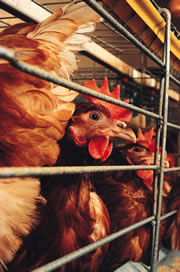Bird flu threatens East Asia
No cases of transmittance of bird flu from person to person have been reported yet
On Thursday this week the World Health Organization officially confirmed cases of bird flu transmittance from birds to humans in China and Indonesia. As a result, at least nine people died and dozens fell ill in China and Indonesia. Laboratory tests showed that the H5N1 virus killed a 24-year-old woman in one of the eastern provinces of China. The victim was employed by a private poultry farm. Another case of bird flu was reported in the central Hunang province, a nine-year-old boy is in a critical condition at hospital. Two local girls, 16 and 20 years old, caught bird flu in Indonesia. 
However, no cases of transmittance of bird flu from person to person have been reported yet, pointed out Hank Backadam, a WHO representative. “We have no evidence showing that the virus began to spread among the humans, otherwise the number of patients would be a lot higher,” said he. Meanwhile, other specialists are not so optimistic. According to U.S. microbiologist Ken Alibek, the virus of bird flu will undergo mutation in the near future. Consequently, a bird flu epidemic could kill from 100 million to 500 million people all over the world.
Mr. Alibek said that the bird flu virus was going through changes. Despite “a very small number” of cases involving persons directly infected by the bird flu virus, the virus becomes a lot more dangerous to humans since mammals e.g. pigs now contract flu from birds. The scientist denies the allegations of some researchers about the viruses of bird flu and SARS being the man-made products. “We have no evidence whatsoever to support this information,” said Mr. Alibek during a press conference.
In the meantime, a period of 13-14 weeks at the least will be required for production of the vaccine capable of protecting humans if bird flu reaches the pandemic proportions, according to Didier Hosh, a prominent French scientist, president of Sanofi-Paster corporation. The company is France's largest manufacturer of vaccines. The scientists said that the above period should be counted from the moment when the WHO experts identify a virus and transfer its samples to vaccine manufacturers.
Mr. Hosh also said that the experiments that are currently under way in France aim to determine whether one or two vaccinations are needed to curtail flu whose virus is still unknown. Efficiency of the pharmaceutical industry in manufacturing required amounts of anti-flu vaccine will largely depend on a successful outcome of the experiments. The experiments will also enable researchers to find out how many antigens a dose of the new vaccine should contain.
Subscribe to Pravda.Ru Telegram channel, Facebook, RSS!





